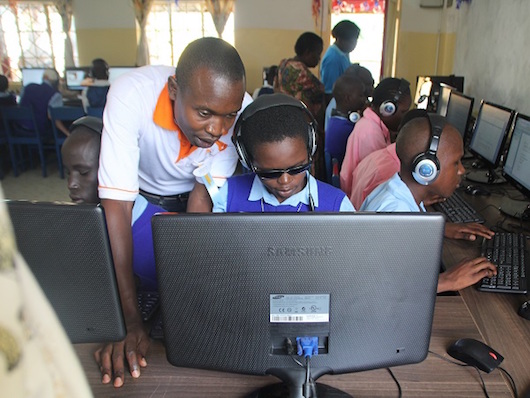Technology Will Assist Visually Impaired Students in Kenya
 New assistive learning technology will assist 365 blind and visually impaired students at the St. Oda Primary and Secondary School for the Blind in Siaya County, Kenya.
New assistive learning technology will assist 365 blind and visually impaired students at the St. Oda Primary and Secondary School for the Blind in Siaya County, Kenya.
The new technology comes from Computer Labs for the Blind, an initiative created by InAble, Access Kenya and the Rockefeller Foundation. The program works to train blind and visually impaired students and their teachers in basic computer skills, according to It News Africa. The skills taught include Internet access and online education content.
The initiative is targeting almost 1,700 students countrywide. So far four of 11 schools for blind and visually impaired students in Kenya have adopted the technology, according to Voice of America.
The technology costs around $1,000 dollars to install, but InAble is providing it to schools at no cost.
According to InAble, Access Kenya and the Rockefeller Foundation, students developing these skills will be more employable. The education of the blind and visually impaired has faced many challenges. For example, traditionally blind and visually impaired students in Kenya who make it to high school are excluded from sciences because the Kenyan educational system does not recognize them as a viable part of the curriculum.
Executive Director of InAble Kenya, Irene Mbari Kirika, said, “The scarcity of facilities and human capital for the blind and visually impaired have for a long time meant that they cannot compete equally with their sighted peers. They either find it difficult to start an education or complete the same under challenging conditions that make it impossible to build a foundation for self-reliance and contribution to the community, pushing them into begging and other forms of activities for their survival.”
This new assistive technology is a step towards helping overcome the previous obstacles blind and visually impaired students have faced in the past.
A visually impaired student named Luca Mwanzia, age 17, says the technology has opened up new frontiers.
Mwanzia says, “Braille books are quite expensive and you have to use quite a sum to purchase one. But now since we have computers we get the books at virtually no cost. So we download the various books to read and when we are done we just close the program.”
Access Kenya is investing six million Kenyan shillings towards InAble’s project, Assistive Technology Labs. This money will bring online technology to six public and primary schools that cater to the blind and the visually impaired, all within the next 12 months.
– Jordan Connell
Sources: It News Africa, Voice of America
Photo: IT News Africa
